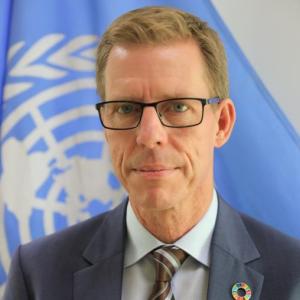The past 16 months were like no other, where the world has not only faced challenges related to the health impact of COVID-19 pandemic, but also the socio-economic impact that almost affected all aspects of our lives.
A shadow pandemic that has exposed the inequalities of our societies.
Women and girls, in particular, are at the forefront of the battle against the pandemic as from high job losses to exploding burdens of unpaid care, from disrupted schooling to an escalating crisis of domestic violence, women’s lives have been upended, in Jordan as well as all over the world. The consequences will far outlast the pandemic.
The COVID-19 pandemic has exacerbated key risk factors for Gender-Based Violence. Globally there has been an alarming increase in multiple forms of violence against women and girls, especially physical, psychological, sexual and economic forms of domestic violence fueled by household economic and food insecurity and confined living conditions due to lockdown and social isolation measures.
School closures, financial and food insecurity have heightened the risk of violence for girls including sexual exploitation, harassment, and child marriage.
There are also reports of increased sexual abuse and harassment, both online and offline, and in some settings, an increase in femicides. As clearly set out in the UN SG’s report on socio-economic impact of the COVID-19 pandemic, this is not only a public health crisis, but humanity is running a risk of reversing decades of progress in the fight against poverty and exacerbating already high levels of inequality.
Since the onset of COVID-19, and by working closely with partners, the Government of Jordan had put in place significant measures to counteract the negative impact of the pandemic.
As UN system, we remain fully committed to supporting national efforts, not only while responding to the pandemic, but also after the crisis towards building forward better.
The UN in Jordan has been supporting their implementing partners in scaling up online services for survivors of violence including hotlines for psychosocial support, and multi sectoral services.
Moreover, the UN has and remains in working closely with the Government of Jordan not only to ensure services are in place but also response is coordinated, and priorities informed by the voices of women and girls.
Looking ahead, targeted gender-responsive investments, economic stimulus packages and recovery plans are now considered fundamental strategies for sustainable recovery, with vulnerable women at the centre.
The return of investment is multiple. Global evidence shows that social care expansion and redistribution can have a positive impact not only to gender equality but also to interlinked issues of poverty reduction, decent jobs creation and equality by socio-economic status.
Most importantly, when women lead and are fully engaged in such processes, we see positive results. By way of example, when more women participate in public life and policymaking, the entire society can benefit as greater emphasis and resource allocations point to social policies, environmental priorities and issues like health, education, childcare, infrastructure, ending violence against women.
Another priority area of action is strengthening all women’s voices, including those of women facing multiple and intersecting forms of discrimination, leaving no one behind in public life.
This is a collective responsibility and all of us, can play a key role in both raising awareness on COVID-19 as well as in narrating the ‘new normal’, creating a sense of unity and solidarity in times of confinement. There are several lessons learnt and good practices, especially in terms of reaching out to the most vulnerable.
In concluding, and as Jordan’s attention turns towards recovery and resilience, we look forward to this opportunity of catalyzing joint action and advocacy to engage and empower women in this process and achieve an inclusive and transformative recovery. It also reminds us that inclusive decision-making and sustainable solutions are critical to not only an effective pandemic response and recovery but also to peaceful, secure and stable societies.


